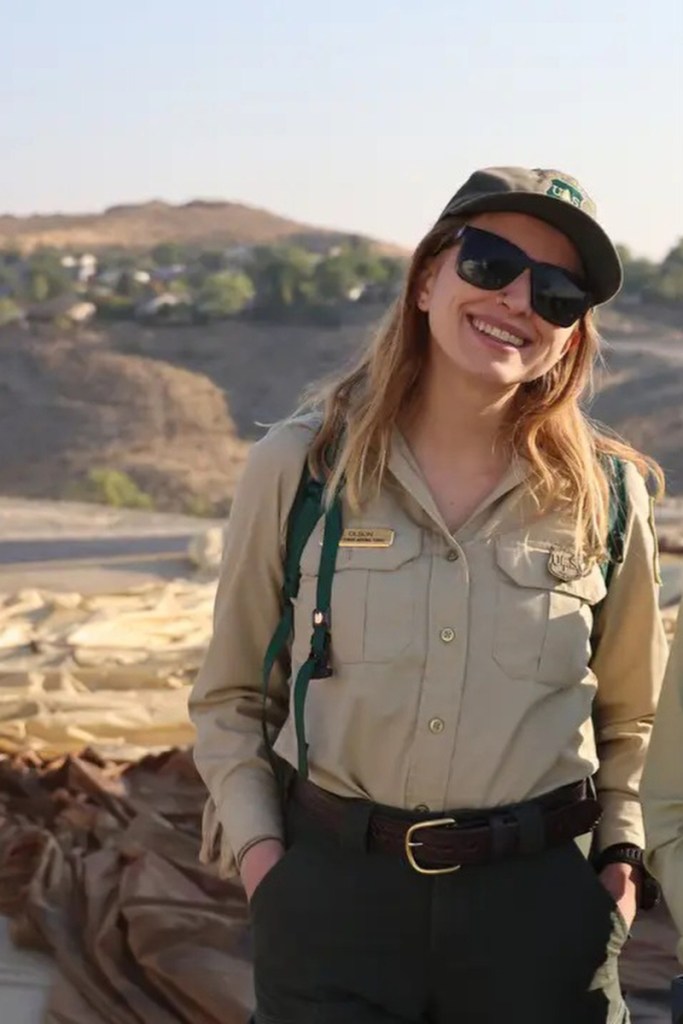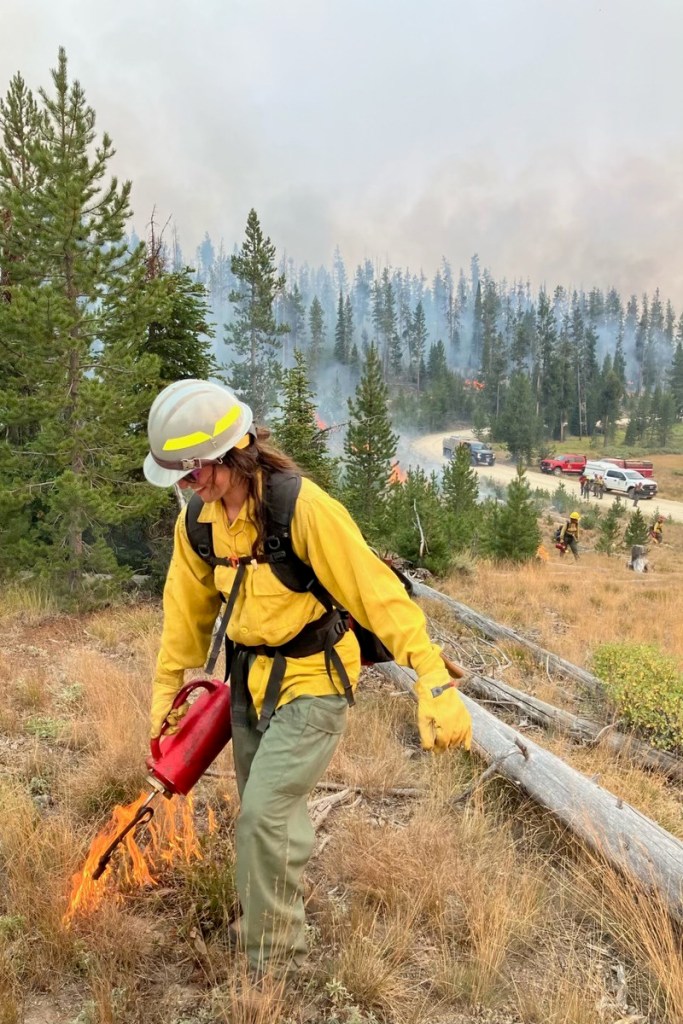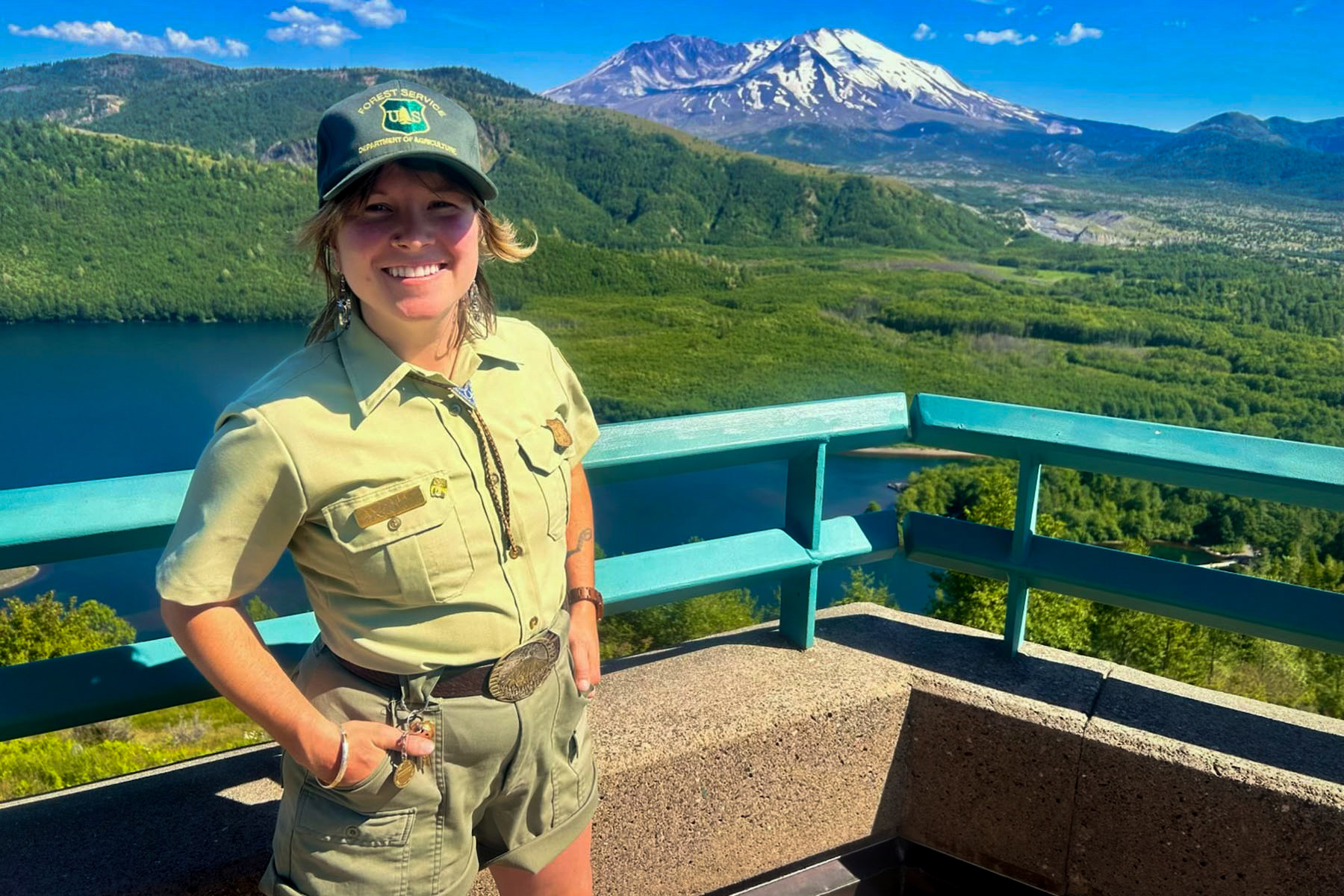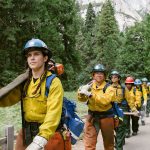Anna Coburn vividly remembers the moment she realized she wanted to be a park ranger.
It was 2013, and she and her dad had just road tripped across the country from Alabama to Wyoming’s Grand Teton National Park with a canoe strapped to the top of her dad’s truck.
When they arrived at the park, she walked up to the visitor kiosk where a woman park ranger helped them figure out which lake they should go to for the day.
“I remember looking at her and looking at her little hat and looking at the big smile on her face, and I was like, ‘That’s what I want to do,’” Coburn said.
After graduating from the University of Alabama in 2015, Coburn got an internship with the U.S. Forest Service at the Mount St. Helens National Volcanic Monument in Washington. Her dad was so excited for her to embark on this adventure. And as a queer woman, Coburn was happy to get some distance from her conservative-led home state.
The job, which involved educating visitors about the volcanic eruption that occurred there in 1980, quickly became her passion.
“I never felt like I worked a day in my life, because I was always so happy to teach people about how cool this volcano was,” Coburn said.
She returned for the next two summers before moving to Colorado for a master’s program. She continued to work on public lands, in national parks and forests, paying her dues in the federal service in the hopes she would be able to secure a coveted permanent position with benefits like health insurance and retirement, which can typically only be attained after years of working as a seasonal employee. In 2024, over a decade after she was greeted by the woman park ranger in the Grand Tetons, she was hired back on at Mount St. Helens as a lead park ranger. The offer came at the perfect time: Coburn was itching to leave Colorado, and her dad had recently passed away.
“It felt like the perfect place to grieve and do a job that I wake up every day just excited to get out of bed and overwork myself, because I think it’s such an important mission,” she said.
But in mid-February, the job that Coburn had poured her life into, and that had meant so much to her, was ripped away.
As a probationary employee, Coburn was one of 2,000 people fired from the Forest Service that week by the Trump administration’s so-called Department of Government Efficiency, which is run by Elon Musk. In the federal government, probationary simply means that an employee had been hired in the last year or two or had recently been promoted. With limited employee protections, they are among the easiest to fire.
The culling of workers could hurt the demographics of the workforce in an agency that has spent decades trying to bring women, and more recently LGBTQ+ people, into what is still a predominantly male career.
Many affected employees say they were told their firing was related to poor performance despite excellent reviews. An independent commission tasked with reviewing disputes between workers and federal employers issued an order on Wednesday to reinstate these employees until April while the firings are investigated. The Department of Agriculture, which oversees the forest service, has five days to comply.
While Coburn is happy that her firing was deemed illegal, the order doesn’t make her feel much better about her future.
“It doesn’t feel secure at all, and I know that there is a massive reduction in force effort coming down the pipe that those of us that may be reinstated might still be [fired] anyway,” Coburn said.
The Trump administration is touting the cuts as part of an effort to reduce wasteful government spending, yet the total cost of employee wages in the government makes up just 4 percent of the federal budget.

Erikka Olson, a wilderness ranger for the Humboldt-Toiyabe National Forest, which extends from Nevada to California, said she made just $21,000 last year. Like many forest service employees, she is typically furloughed for parts of the year, meaning she doesn’t receive a paycheck for chunks of time when her job isn’t needed.
“That’s not even like a drop in the budget of federal funding,” she said.
But while the cost savings associated with firing her are small, the consequences for the land could be far reaching. Depending on what happens after April, the 102,000 acres of wilderness areas Olson oversaw could be left unattended this summer — the only other wilderness ranger was fired too. Olson’s job consisted of trail work, like clearing logs from paths, and collecting data about visitor usage to monitor impact to the land.
Olson also spent a lot of time interacting with visitors out on the trails and serving as a resource in case of a medical emergency or if a fire ignites. “It’s really helpful to have boots on the ground in a lot of these places,” she said, particularly in more remote areas, where it can be a welcome site to see a ranger and be able to ask them questions.
Nearly everyone from the trail crew she used to work with was also fired, leaving just one person left to manage trails for her entire district. The cuts came on top of a hiring freeze instituted under the Biden administration, which meant thousands of seasonal forest service employees would not be hired back this year due to budgeting constraints.
Olson predicts many trails will become inaccessible to visitors and she worries about the upcoming fire season. Without people like her to educate about campfire safety and to work on fuel management — the clearing of brush and downed trees that make good fire kindling — the forest will be at a higher risk of burning in an already dry year, she said.

Sarah Fuller, a front country ranger in the Sawtooth National Forest in Idaho, said she was one of many employees fired who hold a red card, a qualification needed for wildland firefighting. While it wasn’t her primary job, she, like many forest service workers, mobilized to fight fires when necessary. Last year she helped fight the Wapiti Fire, which was ignited by a lightning strike and burned over 100,00 acres.
She also was classified as a forest protection officer, which allowed her to write tickets if she encountered people breaking rules like not camping in designated areas. Now, there could be an uptick in unattended visitors, camping and driving wherever they want, she said. “It’s just going to ruin resources.”
The impacts extend beyond land stewardship. The abrupt firings are also decimating the livelihoods of workers like Fuller, Olson and Coburn, who spent the majority of their early careers working up a very specific kind of job ladder to get stable permanent jobs. This was after years of trying to make ends meet with low wages in the West where housing prices have skyrocketed. At one point Fuller lived in her van. This summer she was depending on living in government housing.
All of the women lost their health insurance. And future job prospects look grim, with thousands of people now flooding the job market in adjacent fields, like state ranger jobs.
But even before the firings, the change in administration had already impacted their morale. Fuller, Olson and Coburn are part of the LGBTQ+ community, and were witnessing the rapid implementation of new policies aimed at complying with the administration’s executive orders on DEI and gender ideology.
Olson, who has been volunteering as a ranger in Yosemite National Park, where her girlfriend works, has seen all the gender-inclusive bathrooms changed to male or female. She recently heard an employee suggest that maybe they should take down Pride flags that had been on their desks to avoid running into issues with Trump administration policies. With employee resource groups being disbanded, including one for LGBTQ+ workers, she worries about the splashy annual Pride events in Yosemite.
“All these little things contribute to an overall environment where people can feel unsafe to be who they are in the workplace,” she said.
Coburn, like the others, is trying to find her footing in her new reality. She was supposed to be working at a visitor center at the Mount St. Helens Volcanic National Monument, but unless she and other employees get hired back permanently, she doesn’t even think it’ll be able to open this summer.
She’s sad to miss out on sharing her knowledge about the volcanic eruption and how the landscape has recovered in the decades since, something she calls a “marvel.”
“It’s so unique, and it draws people from all over the planet to come see it,” she said. But now she worries they won’t get that chance.
Coburn’s currently working at a hardware store, a job she got to make ends meet on her furlough.
In the past two weeks she’s applied for state park jobs but says the process has been heartbreaking after having to leave a position she cared about so much. Now she’s waiting to hear on the next steps from her supervisor about whether she will be reinstated. Even if she ends up being cut once again, she at least feels better about knowing her performance won’t be unfairly documented as the reason why she lost her job.
But Coburn’s future looks much different today than it did just a year ago.
“The idea I had to grow into that old lady at Grand Tetons has just completely been changed forever,” she said.





